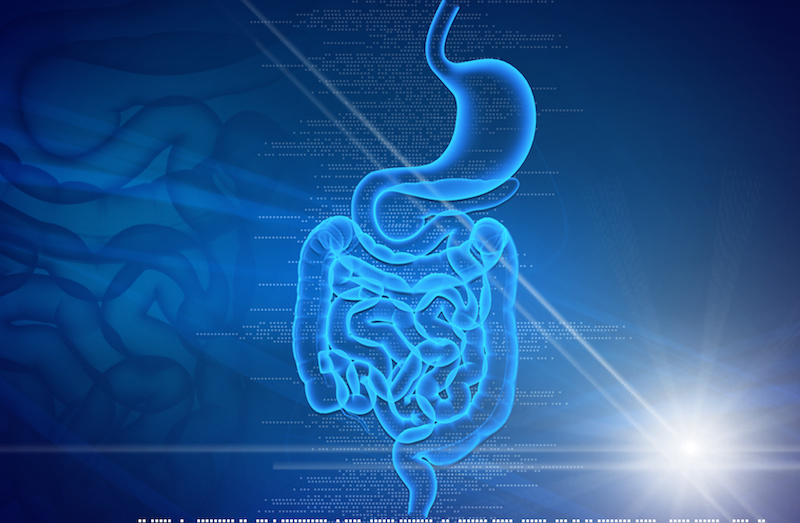Four ways to manage the impact of cystic fibrosis on the GI system

Cystic fibrosis, a genetic disorder that affects the lungs and other organs, used to be considered a childhood disease with a very high mortality rate. But today, thanks to improvements in screenings, diagnosis, and treatments, as well as a deeper understanding of the importance of managing nutritional status, people with cystic fibrosis are living into their mid- to late-30s, -40s, and even beyond. With this improved longevity comes a host of new medical challenges that are important for clinicians and gastrointestinal (GI) specialists to address.
Specifically, one important concern is the impact of cystic fibrosis on the gastrointestinal tract, since this is closely linked to growth and pulmonary function and thus to mortality, explains Sabina Sabharwal, MD, MPH, attending physician with the Division of Gastroenterology, and director of the GI Program for the Cystic Fibrosis Center, both at Boston Children’s Hospital.
Sabharwal recently published a paper in Gastroenterology & Hepatology that provides a valuable framework for physicians and GI specialists to help them manage the impact of this disorder on the GI tract, as well as on other organs, and to ensure patients are maintaining the right nutritional balance for health. This information can also provide important insights for patients and families.
Here are four considerations Sabharwal says are essential for people with cystic fibrosis:
1. Use proper dosing of pancreatic enzyme replacement therapy (PERT) to treat pancreatic insufficiency.
About 85 percent of people with cystic fibrosis are pancreatic insufficient by age 1 or 2. This means that the nutrients in foods and drinks aren’t absorbed properly, putting people at risk of losing weight and being vitamin deficit; also experiencing related GI side effects. Using PERT can be essential to counteract growth failure and achieve better outcomes, such as improved infection resistance and better management of chronic lung disease for higher quality of life and longer life expectancy. However, the Cystic Fibrosis Foundation stresses that too much PERT can lead to negative health effects, so following dosing guidelines is essential.
2. Use vitamin supplements for fat-soluble vitamin deficiency.
Patients with cystic fibrosis who are pancreatic insufficient are at risk for fat-soluble vitamin deficiency — specifically for vitamins A, D, E, and K — so they are screened annually for this. Vitamin A deficiency is associated with blindness. Vitamin E deficiency is associated with anemia and neurological issues. Vitamin K deficiency is associated with bleeding problems. Vitamin D deficiency is associated with poor mineral density that can lead to bone disease. Severe lung disease and malnutrition can also reduce mineral density, worsening the problem. The Cystic Fibrosis Foundation recommends taking vitamin D3 (cholecalciferol), which is the type of vitamin D naturally produced in the skin by sunlight.
3. Monitor body mass index (BMI) and increase higher energy intake as needed for improved weight gain.
Since nutritional status is so closely linked to lung function and overall health in people with cystic fibrosis, it is important to pay close attention to BMI levels. BMI has been found to have a significant correlation with lung function. Children with cystic fibrosis should maintain a BMI of at least the 50th percentile. Adult females with cystic fibrosis who at least 20 years old should maintain a BMI at or above 22, and adult men with cystic fibrosis should maintain a BMI at or above 23. The Cystic Fibrosis Foundation also recommends that people with cystic fibrosis eat a high-calorie meal with unlimited fat for higher energy intake, which is essential for weight gain.
4. Watch for constipation symptoms and address promptly to head off complications.
Constipation is very common in patients with cystic fibrosis and the risk increases as they age. They can present with abdominal pain, nausea, vomiting, and distension. Constipation is very important to address at the early signs, especially since it can lead to bowel obstruction. Stool softeners, maintaining proper hydration, and proper use of PERT are helpful treatments for constipation in cystic fibrosis.

Sabina Sabharwal, MD, MPH, is an attending physician with the Division of Gastroenterology, and director of the GI Program for the Cystic Fibrosis Center, both at Boston Children’s Hospital, as well as an instructor of pediatrics at Harvard Medical School.
To reach Dr. Sabharwal, please call our Division of Gastroenterology at 617-355-6058.
Related Posts :
-

Team spirit: How working with an allergy psychologist got Amber back to cheering
A bubbly high schooler with lots of friends and a passion for competitive cheerleading: On the surface, Amber’s life ...
-

Thanks to Carter and his family, people are talking about spastic paraplegia
Nine-year-old Carter may be the most devoted — and popular — sports fan in his Connecticut town. “He loves all sports,” ...
-

Genetic causes of congenital diarrhea and enteropathy come into focus
Congenital diarrheas and enteropathies are rare and devastating for infants and children. Treatments have consisted mainly of fluid and nutritional ...
-

Genomic sequencing transforms a life: Asa’s story
Asa Cibelli feels like he’s been reborn. The straight-A middle schooler plays basketball and football, does jiu jitsu, is ...





